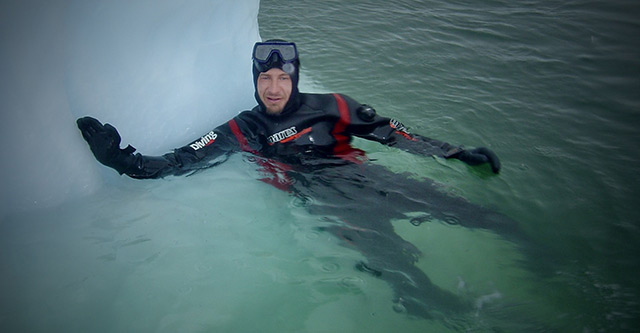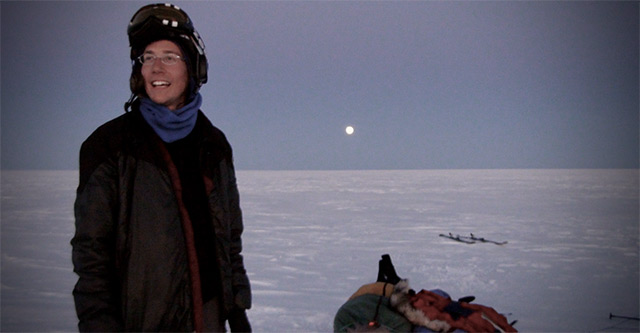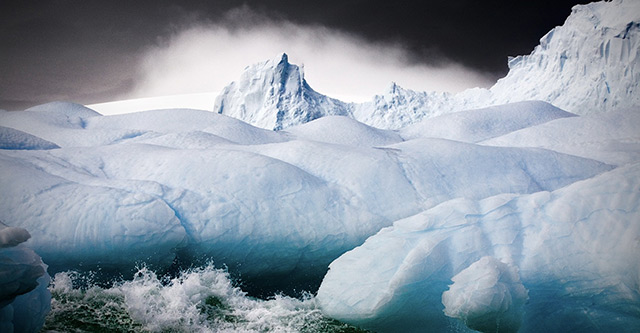APPS
APPS
Antarctica - The Legacy Crossing is a compelling feature documentary that chronicles an unprecedented feat in the world of polar exploration. Covering Antarctica’s unforgiving landscape, this film captures the journey of renowned polar explorer, climate researcher, photographer, and author Sebastian Copeland, alongside fellow explorer Eric McNair-Landry, as they attempt a monumental traverse of the continent. Together, they embark on a historic expedition from Antarctica’s East Coast, through the Pole of Inaccessibility, to the West Coast—a route no one has ever successfully crossed.
Antarctica, larger than the continental United States, is known for its brutal temperatures and some of the most extreme storms on Earth. Its unforgiving landscape has claimed the lives of many explorers throughout history, making it one of the most challenging environments on the planet. The Pole of Inaccessibility, the point farthest from any Antarctic coastline, represents the harshest and most isolated area on the continent, a place where human survival is continuously tested.
In Antarctica - The Legacy Crossing, viewers are brought into the heart of this perilous journey, where Copeland and McNair-Landry face relentless winds, extreme cold, and the psychological demands of polar exploration. The documentary not only showcases their grit and determination but also highlights the stark beauty and fragility of this remote wilderness. Through Copeland's expert storytelling and visual artistry, The Legacy Crossing serves as both an adventure story and a sobering reminder of Antarctica's critical role in the global climate system.
This film offers a rare glimpse into one of the last true frontiers on Earth, pushing the boundaries of human endurance and shining a light on the impact of climate change in one of the planet’s most pristine environments. Antarctica - The Legacy Crossing is more than a documentary; it’s a tribute to the resilience of explorers and the awe-inspiring, formidable beauty of the Antarctic landscape.
More with Sebastian Copeland: Across the Ice, Into the Cold
| 2026
Tags: Sebastian Copeland Adventures,
COMING SOON TO CORE

The journey from Antarctica's East Coast through the Pole of Inaccessibility to the West Coast of Antarctica covers some of the most remote and inhospitable regions on Earth. Navigating through treacherous terrain, including crevasse fields, ice ridges, and unpredictable weather conditions, the region experiences some of the coldest temperatures on Earth, with average winter temperatures dropping well below -40°C (-40°F).
The Pole of Inaccessibility is the point on the Antarctic continent that is farthest from any coastline. It is located at coordinates 82°06′S 54°58′E and is approximately 878 miles (1,408 kilometers) from the nearest coast. The area is extremely remote and difficult to access due to its distance from established research stations and logistical support.
As it presents significant challenges it also offers unparalleled opportunities for scientific exploration and discovery in one of the most remote and pristine environments on Earth. The Pole of Inaccessibility holds scientific significance for researchers studying glaciology, climate change, and polar ecosystems. It provides valuable insights into Antarctica's ice dynamics and its role in global climate systems.
It is also home to diverse wildlife, including penguins, seals, and seabirds and a rich marine ecosystems due to the upwelling of nutrient-rich waters from the Southern Ocean.

Sebastian Copeland, a British-French-American, is a world-renowned polar explorer, climate researcher, environmentalist, photographer, and author. With a career that has seen him lead 27 polar missions, Copeland’s commitment to environmental protection and his relentless pursuit of a sustainable future have shaped his life's work. Combining his skills as a climber and mountaineer with a passion for polar exploration, Copeland uses visual arts as a powerful tool to document and inspire social change, bringing the beauty and vulnerability of Earth’s polar regions to global audiences.
Copeland's work has been widely celebrated and featured in National Geographic, Vanity Fair, GQ, Marie Claire, Elle, Outside, American Photo, The New York Times, People Magazine, USA Today, and Paris Match, as well as on NBC, CBS, NPR, and CNN’s Larry King Live. Through his expeditions and photography, he captures the transformative changes happening in these fragile regions, urging immediate action on climate issues.
In his polar exploration career, Copeland achieved a Guinness World Record for covering 595 kilometers in a single day, a feat that highlighted both his resilience and skill in navigating some of the world’s harshest environments. His exceptional talent has also earned him the International Photographer of the Year award in 2024 and three additional honors at the International Photography Awards in 2006 and 2007, including Professional Photographer of the Year for his bestselling book Antarctica: The Global Warning.
As an author, Copeland has published several influential works that underscore the critical importance of environmental conservation. His recent publications include Antarctica: The Waking Giant (2020), offering a profound exploration of the Antarctic landscape and the pressing challenges it faces due to climate change. Another notable work, Polar Explorations: To the Ends of the Earth (2022), provides an immersive look into the art of polar travel, combining stunning visuals with insightful narratives to inspire a deeper appreciation for these remote regions.
In addition to his literary and photographic achievements, Copeland is a dedicated climate advocate. He has addressed the United Nations, government bodies, universities, and Fortune 500 companies, highlighting the systemic transformations taking place in the polar regions and their geopolitical consequences. His activism has earned him a seat on the Board of Directors for the U.S. Branch of Mikhail Gorbachev's Green Cross International and for Shine On Sierra Leone. In recognition of his environmental efforts, he was awarded the National Order of Merit by French President Emmanuel Macron in 2019.
Sebastian’s explorations, including his 27 polar missions, serve as powerful platforms for raising awareness about climate change, inspiring audiences worldwide to understand and protect our planet’s most vulnerable regions. Through his compelling imagery, daring expeditions, and commitment to conservation, Sebastian Copeland continues to champion a sustainable future, reminding us of our collective responsibility to safeguard the Earth for generations to come.

Eric McNair-Landry is a distinguished Canadian adventurer and filmmaker renowned for his extraordinary polar expeditions and commitment to environmental conservation. Raised in Iqaluit, Nunavut, Eric grew up in a family of Arctic explorers—his parents, Matty McNair and Paul Landry, are respected polar guides who instilled in him a deep appreciation for the natural world and a passion for adventure from an early age.
Eric’s achievements include multiple crossings of Greenland’s ice cap. In the 2010 season, Eric joined Sebastian Copeland on a mission that set a Guinness World Record for the longest distance traveled in 24 hours, a testament to their teamwork and resilience. The following year, during the 2011-2012 season, Eric and Sebastian embarked on one of their most ambitious adventures: a 4,100-kilometer journey across Antarctica. This expedition pushed the limits of human endurance and showcased their expertise in navigating the planet's harshest conditions.
Beyond exploration, Eric is a passionate advocate for environmental preservation and the promotion of Inuit culture. He co-founded Pittarak Expeditions with Sarah to inspire youth to connect with the outdoors and foster an appreciation for the Arctic ecosystem. In 2013, he led the "Qajaqtuqtut Expedition," during which he and his team built traditional Inuit-style kayaks and undertook a 1,000-kilometer journey across Baffin Island. This project aimed to revive interest in Inuit kayaking traditions and celebrate their cultural heritage.
Eric’s work has been featured in National Geographic, where he was named an Adventurer of the Year in 2007. His expeditions have also inspired documentaries and educational programs, emphasizing the importance of protecting polar regions and addressing climate change.
Through his groundbreaking expeditions and dedication to cultural and environmental advocacy, Eric McNair-Landry continues to inspire others to explore and protect the world’s most fragile and remote landscapes.

Antarctica is located at the southernmost part of the Earth, encompassing the South Pole. It has a rich history of exploration, dating back to the early 19th century. Famous explorers such as Ernest Shackleton, Robert Falcon Scott, and Roald Amundsen undertook daring expeditions to explore the continent and reach the South Pole. The heroic age of Antarctic exploration laid the foundation for scientific research in the region.
Antarctica is governed by the Antarctic Treaty System, which regulates human activities on the continent and its surrounding waters. The treaty, signed in 1959, designates Antarctica as a zone of peace and scientific cooperation and prohibits military activity, mineral mining, and nuclear testing. It also protects the continent's unique ecosystem and wildlife.
Antarctica is the coldest, driest, and windiest continent on Earth. Much of the continent is a cold desert with very low precipitation rates. The interior of Antarctica is extremely cold, with temperatures regularly dropping below -60°C (-76°F) in winter. The continent is also characterized by vast ice sheets and glaciers, which hold about 70% of the world's fresh water.
Antarctica is the fifth largest continent of the world at 14 million square kilometers and is covered by a permanent continental ice sheet. The ice is distributed in two major ice sheets, the East Antarctic and the West Antarctic, and in addition there are shelf ice, extending over the sea water. Antarctic inland ice ranges in thickness up to 5000 m, with an average thickness of about 2400 m, making Antarctica by far the highest of the continents.


























Comments
Sign in or sign up to post a comment.
Show comments (0)